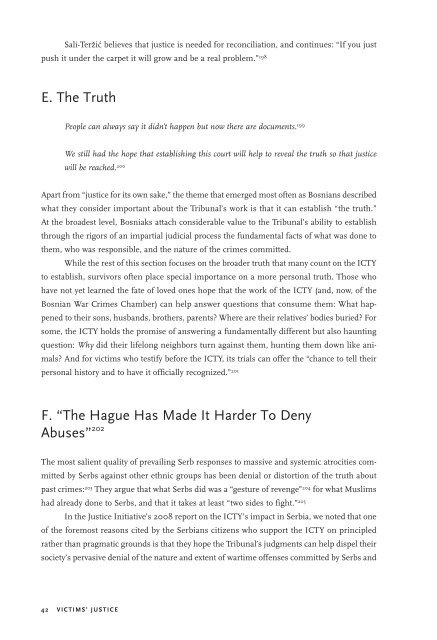That Someone Guilty Be Punished - International Center for ...
That Someone Guilty Be Punished - International Center for ...
That Someone Guilty Be Punished - International Center for ...
You also want an ePaper? Increase the reach of your titles
YUMPU automatically turns print PDFs into web optimized ePapers that Google loves.
Sali-Teržić believes that justice is needed <strong>for</strong> reconciliation, and continues: “If you just<br />
push it under the carpet it will grow and be a real problem.” 198<br />
E. The Truth<br />
People can always say it didn’t happen but now there are documents. 199<br />
We still had the hope that establishing this court will help to reveal the truth so that justice<br />
will be reached. 200<br />
Apart from “justice <strong>for</strong> its own sake,” the theme that emerged most often as Bosnians described<br />
what they consider important about the Tribunal’s work is that it can establish “the truth.”<br />
At the broadest level, Bosniaks attach considerable value to the Tribunal’s ability to establish<br />
through the rigors of an impartial judicial process the fundamental facts of what was done to<br />
them, who was responsible, and the nature of the crimes committed.<br />
While the rest of this section focuses on the broader truth that many count on the ICTY<br />
to establish, survivors often place special importance on a more personal truth. Those who<br />
have not yet learned the fate of loved ones hope that the work of the ICTY (and, now, of the<br />
Bosnian War Crimes Chamber) can help answer questions that consume them: What happened<br />
to their sons, husbands, brothers, parents? Where are their relatives’ bodies buried? For<br />
some, the ICTY holds the promise of answering a fundamentally different but also haunting<br />
question: Why did their lifelong neighbors turn against them, hunting them down like animals?<br />
And <strong>for</strong> victims who testify be<strong>for</strong>e the ICTY, its trials can offer the “chance to tell their<br />
personal history and to have it officially recognized.” 201<br />
F. “The Hague Has Made It Harder To Deny<br />
Abuses” 202<br />
The most salient quality of prevailing Serb responses to massive and systemic atrocities committed<br />
by Serbs against other ethnic groups has been denial or distortion of the truth about<br />
past crimes: 203 They argue that what Serbs did was a “gesture of revenge” 204 <strong>for</strong> what Muslims<br />
had already done to Serbs, and that it takes at least “two sides to fight.” 205<br />
In the Justice Initiative’s 2008 report on the ICTY’s impact in Serbia, we noted that one<br />
of the <strong>for</strong>emost reasons cited by the Serbians citizens who support the ICTY on principled<br />
rather than pragmatic grounds is that they hope the Tribunal’s judgments can help dispel their<br />
society’s pervasive denial of the nature and extent of wartime offenses committed by Serbs and<br />
42 VICTIMS’ JUSTICE

















